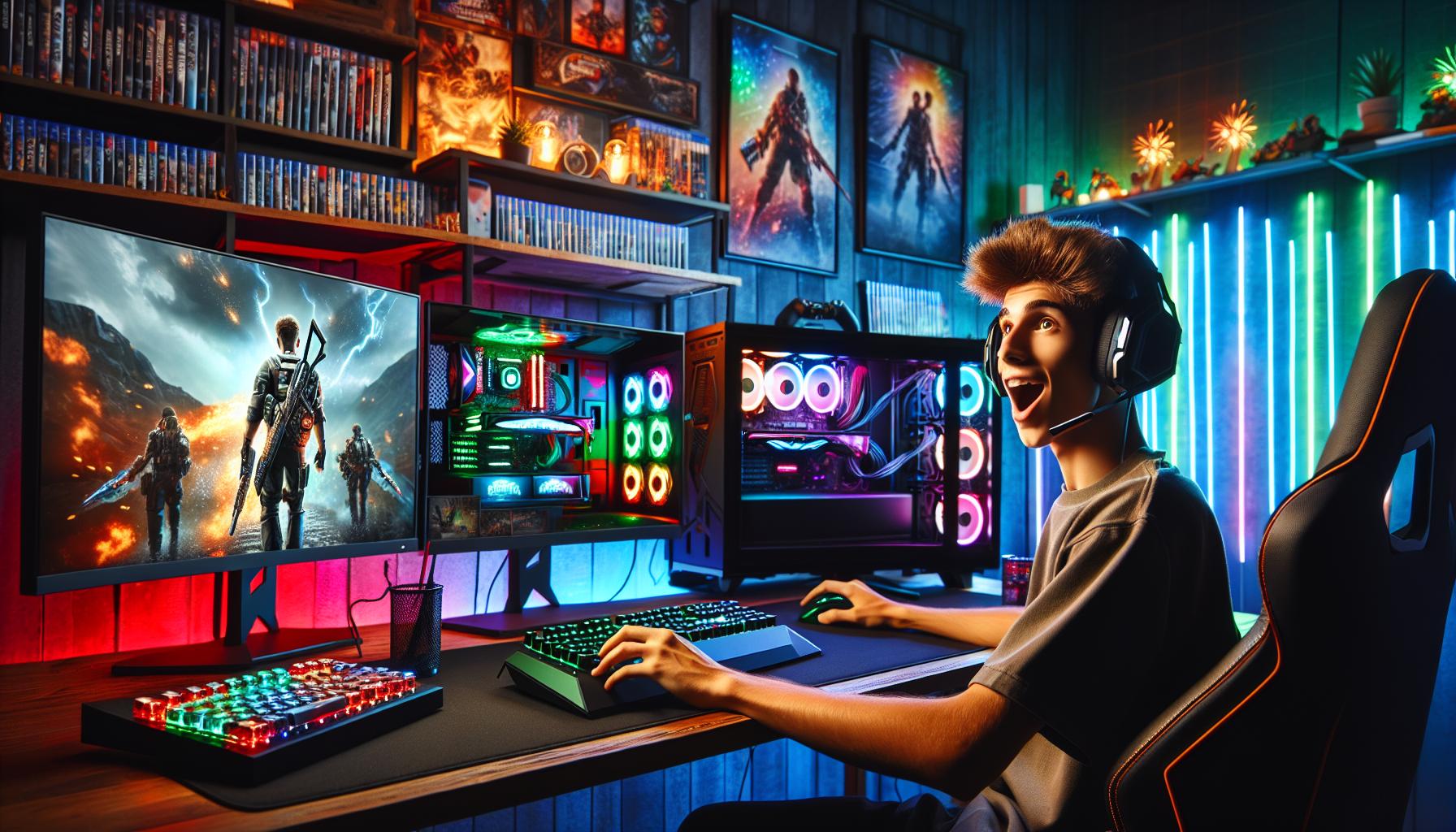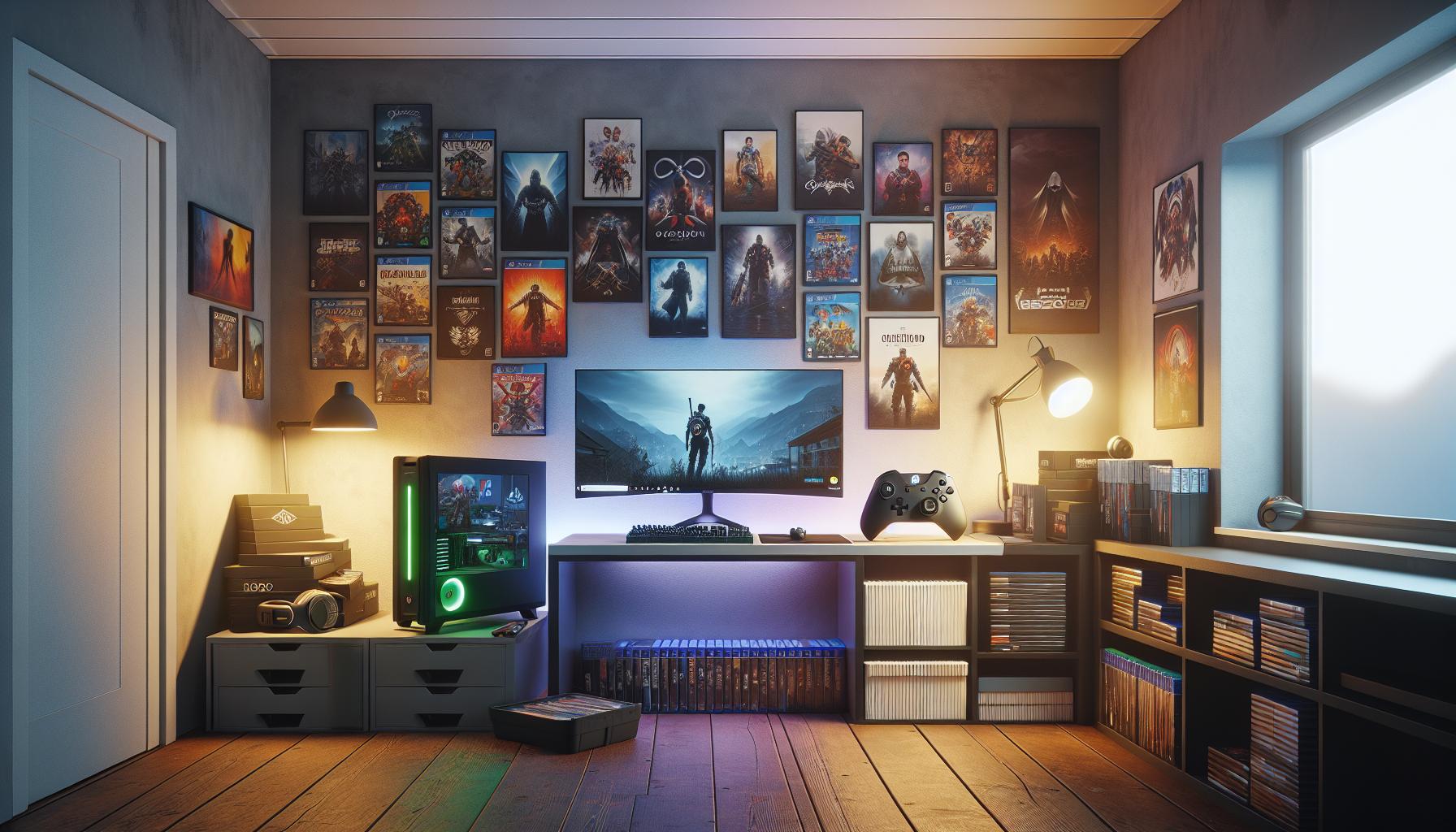When it comes to gaming, the debate between PC and console enthusiasts is as fierce as ever. I’ve spent countless hours exploring both worlds, and each has its unique charm and advantages. But is PC gaming truly better than console gaming?
Key Takeaways
- Performance: PCs generally provide superior graphics quality and higher frame rates compared to consoles, making them optimal for gamers seeking high-performance experiences.
- Cost Analysis: Initial investment for gaming PCs is typically higher than consoles, but PCs offer the advantage of component upgrades and often cheaper game prices, which can provide better long-term value.
- Game Library: PC gaming boasts a vast library, including indie titles and community mods, while consoles offer exclusive titles that may attract dedicated fans.
- Accessibility: Consoles are easier to set up and use, whereas PCs require more setup time but offer extensive customization options for hardware and software, catering to diverse gaming preferences.
- Exclusive Games: Console exclusives often sway gamers towards specific platforms, while PC offers the flexibility of mods and later access to some console exclusives.
- Investment Longevity: Consoles have a shorter lifespan and require upgrades every few years, while PCs allow for incremental upgrades, potentially lowering long-term gaming costs.
Performance Comparison
Performance significantly impacts the gaming experience, and both PC and console gaming offer distinct advantages in this realm.
Graphics Quality
Graphics quality stands out as a primary differentiator between PC and console gaming. PCs can use high-end graphics cards, like the NVIDIA RTX series, which support higher resolutions and advanced features such as ray tracing. Consoles like the PlayStation 5 and Xbox Series X offer impressive graphics, yet may lack the same level of customization. Custom-built PCs can achieve 4K resolution and ultra settings at higher frame rates than consoles, resulting in a visually superior experience in many titles.
Frame Rate and Refresh Rate
Frame rate and refresh rate play crucial roles in gaming performance. PCs often support frame rates exceeding 144 frames per second (FPS), particularly with powerful hardware. Monitors featuring refresh rates of 165Hz or more can provide a smoother experience. In contrast, most consoles typically cap their frame rates around 60 FPS, with some titles reaching up to 120 FPS. Therefore, players seeking competitive advantages and smoother animations often find PCs more suitable for high-performance gaming.
Cost Analysis

Cost considerations play a crucial role in the ongoing discussion of PC gaming versus console gaming. Analyzing initial expenses and long-term value helps clarify which option may offer a better economic proposition.
Initial Investment
Initial investment significantly differs between PC and console gaming. A gaming console, like the PlayStation 5 or Xbox Series X, costs around $500, providing access to an extensive library of games without additional hardware requirements.

In contrast, a gaming PC entails higher upfront expenses. A mid-range gaming rig starts at approximately $800, with high-end builds often exceeding $1,500. This price includes the CPU, GPU, motherboard, RAM, storage, and power supply. Additional costs may arise from peripherals like monitors, keyboards, and mice, which enhance the gaming experience.
Long-Term Value
Long-term value represents another critical factor in the cost analysis. Consoles usually have a defined lifespan of five to seven years, during which newer models might release. Upgrading becomes necessary to keep up with advancing technology.
On the other hand, PCs offer greater flexibility. Gamers can upgrade individual components, like the GPU or RAM, leading to prolonged use without the need for a complete system overhaul. This ability may result in lower long-term costs per year for dedicated PC gamers compared to frequent console upgrades.
Additionally, game prices and sales trends differ between platforms. PC gamers often find sales on platforms like Steam, resulting in lower overall expenses for acquiring games. Consoles tend to maintain standard prices for longer, reducing access to cheaper options.
Initial investment costs and long-term value provide insight into the financial aspects of PC and console gaming, influencing decisions based on one’s budget and preferences.
Game Library and Exclusives

The game library and exclusives significantly influence the choice between PC and console gaming. Each platform offers unique advantages regarding titles and exclusive games, which can sway a gamer’s preference.
Availability of Titles
PC gaming provides access to a vast library of games spanning numerous genres and styles. Major retailers and digital distribution platforms like Steam, Epic Games Store, and GOG offer extensive selections, often including older, indie, and niche titles. I can play a wide range of games, from AAA blockbusters to experimental indie projects, often with community mods and added content that enhance the experience.
Consoles, such as the PlayStation and Xbox, also feature large catalogs but exhibit more restricted libraries. Console exclusives play a significant role in shaping their game availability. Popular series like “God of War” and “Halo” are exclusive to their respective consoles, appealing to specific gaming audiences. However, the overall number of titles available on consoles generally falls short compared to PC offerings.
Exclusive Games

Console gaming often boasts more exclusive games, making it a primary choice for fans of specific franchises. Titles that define platforms include “The Last of Us,” “Bloodborne,” and “Forza Horizon.” These exclusives draw players who prioritize these specific experiences over other factors.
PC gaming, while it lacks some of these exclusives, excels in modding capabilities and user-generated content, extending the longevity and enjoyment of many games. Mods can transform gameplay and introduce new mechanics, keeping even older games fresh and engaging. Additionally, many popular exclusives from consoles often appear on PC sometime later, expanding the library for PC gamers.
In my experience, deciding between PC and console often hinges on personal preferences for game availability and exclusivity. Gamers focused on specific titles may prefer consoles, while those desiring a broader selection might gravitate toward PCs.
Accessibility and Usability

Accessibility and usability play critical roles in the gaming experience. While both PC and console gaming platforms offer unique advantages, their approaches to setup and customization can differ significantly.
Setup and Ease of Use
Setting up a console is straightforward; players connect the device to a TV or monitor, install updates, and start gaming. Consoles often provide user-friendly interfaces tailored for ease of navigation. In comparison, setting up a PC involves multiple components such as the monitor, keyboard, mouse, and possibly additional peripherals. I require time to adjust settings, install drivers, and manage software updates for optimal performance. However, once the setup is complete, the user interface on PC platforms like Steam can offer more robust organization and access to features like game libraries and community content.
Customization Options

Customization options define the experience on both platforms. Consoles, while limited in hardware adjustments, allow for user interface personalization through themes and profiles. Game settings can be adjusted, but they stick to manufacturer specifications. On the other hand, PCs provide extensive customization capabilities. I can select components such as graphics cards, processors, and RAM to create a tailor-made gaming experience. Beyond hardware, PCs enable extensive software modifications, including mods that add gameplay features or enhance visuals. This level of flexibility caters to various preferences, accommodating casual gamers and hardcore enthusiasts alike.
Conclusion
Choosing between PC and console gaming ultimately comes down to personal preference. I appreciate the performance and customization options that PCs offer, making them ideal for those who want the best graphics and frame rates. On the other hand, consoles provide a straightforward setup and exclusive titles that can be hard to resist.
For gamers prioritizing long-term value and a vast game library, PCs shine with their upgradeability and diverse selection. However, if simplicity and exclusive experiences are what you’re after, consoles might be the better fit. Whatever your choice, the gaming world has something to offer everyone.




